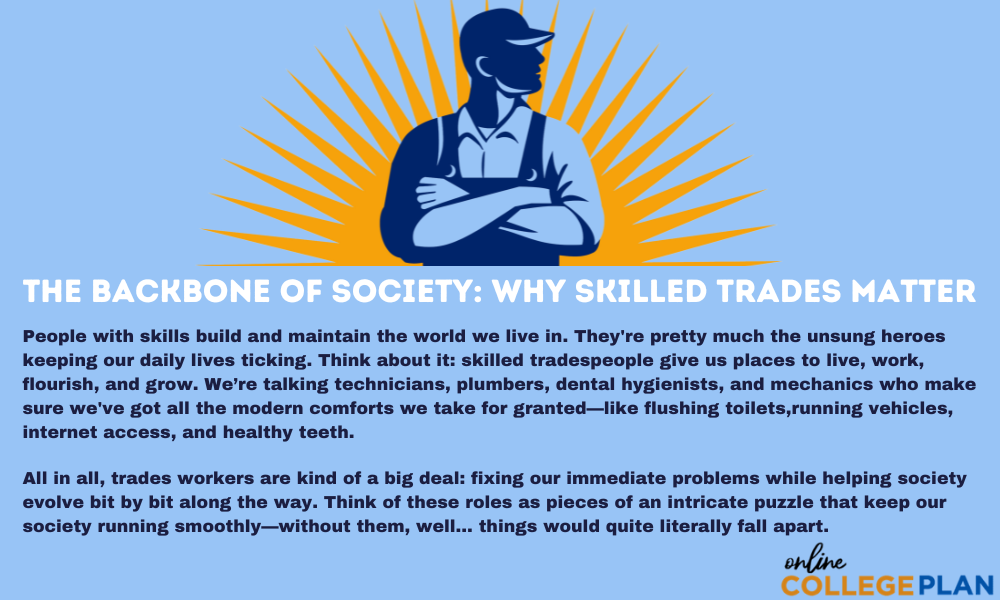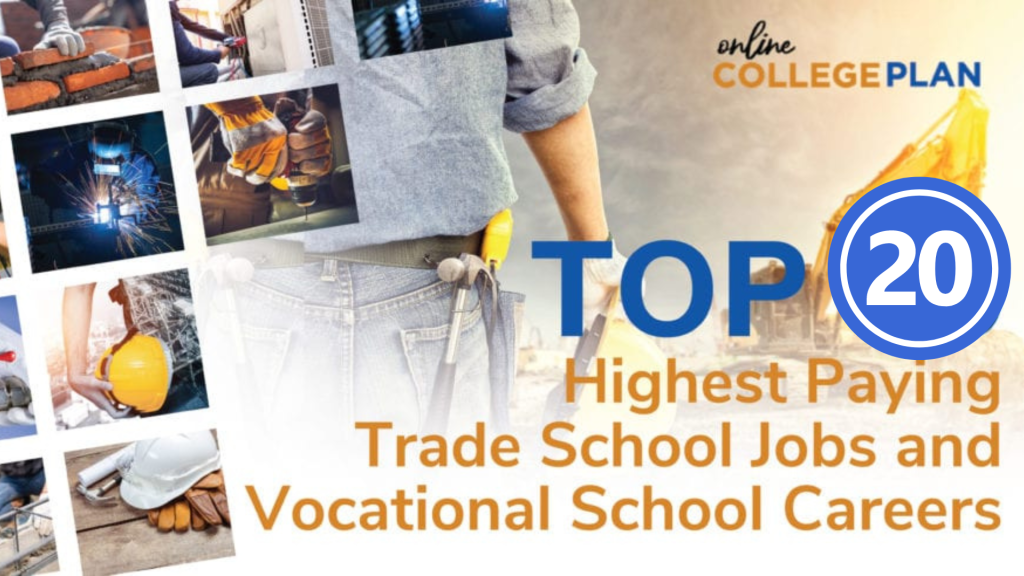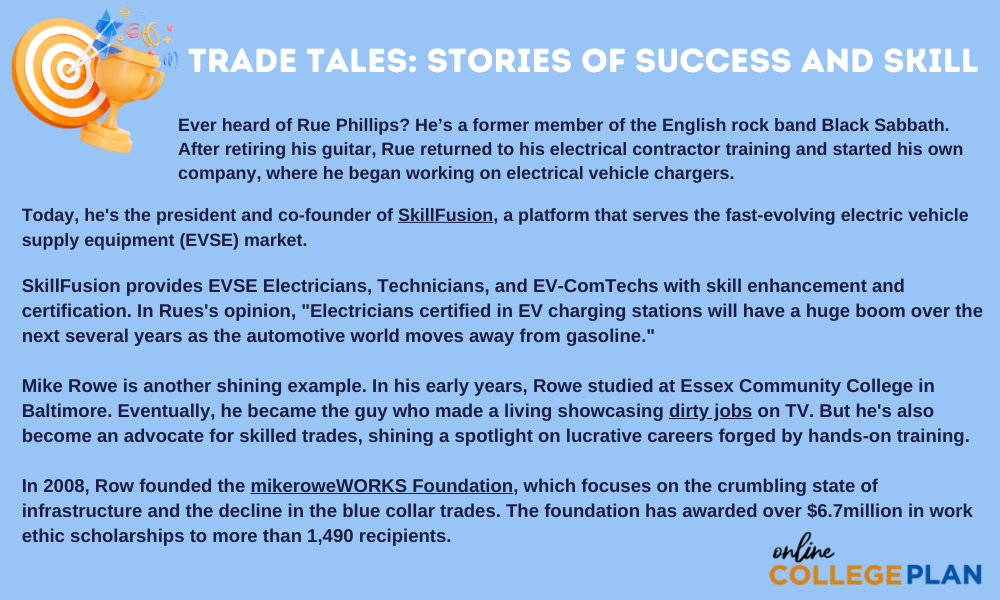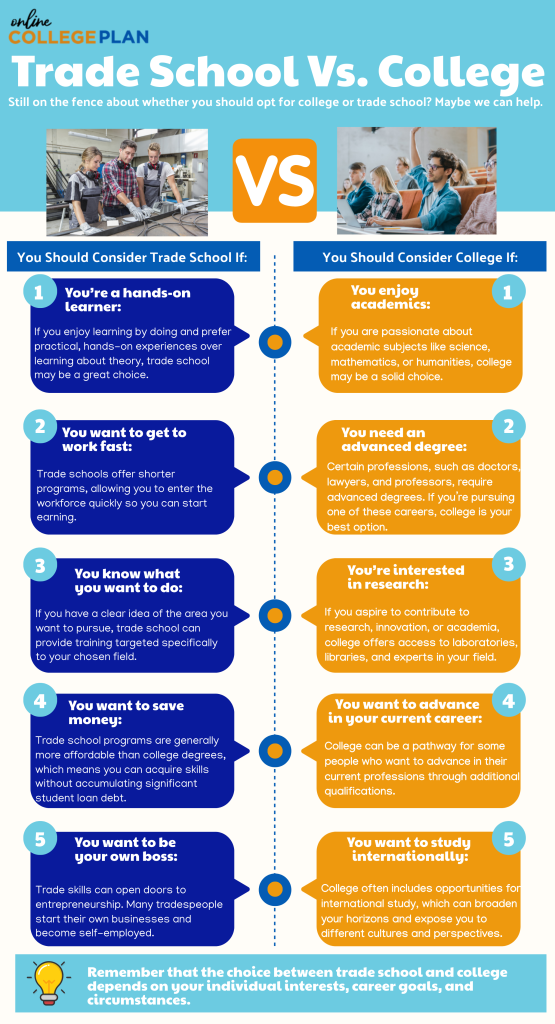Best Trade School Jobs

Find your degree
You’ve got a solid, in-demand skill set, zero student loan debt weighing you down, and a paycheck that makes your friends’ eyes widen. Welcome to the world of trade school careers. These aren’t just jobs; they’re steppingstones to a financially rewarding future without the four-year degree detour.
Dive in and you’ll find out how trade schools can lead to great-paying jobs without spending half your life in a classroom or drowning in student loans. In this post, we’ll start exploring these lucrative paths together. But first, let’s have a look at why more and more high-school grads are leaning more towards trade school than the traditional four-year college path.
See Also:
- Best Career Tools for Trade School Students
- What Is A Trade School?
- Trade School Scholarships
- Top 20 Online Community Colleges with the Best ROI
- Top 50 Best Online Community Colleges for Financial Aid Assistance

There’s High Earning Potential in Skilled Trades
Say goodbye to the outdated notion that success only comes with a university degree. Trade school graduates are snagging spots in industries where demand is high and supply is low—and their bank accounts show it. We’re talking about average annual salaries between $50-$90k right out of school—with some savvy tradespeople raking in six figures as they climb up their career ladders.
Evidence isn’t just anecdotal—numbers speak volumes about this trend. Graduates from vocational schools often find themselves earning more than those who stop at high school diplomas alone because skilled labor doesn’t go out of style or get outsourced easily.
Fast-Track to Employment with a Trade School Education
If you’ve ever watched a cooking show, you know the thrill of watching chefs whip up a gourmet meal in 30 minutes flat. Now imagine applying that same speedy efficiency to education. That’s where trade schools come into play.
These programs are like express trains on the career track—they get you there faster than traditional four-year degrees do. Most take about two years or less—some even wrap up within months. This means while your pals are still hitting the books for their bachelor’s degrees, you could already be knee-deep in work experience and earning real money.
The Rising Demand for Skilled Trade Workers
The demand for skilled trade workers is enormous. Industries across the board are practically scrambling to find qualified electricians, plumbers, welders – you name it. The Bureau of Labor Statistics projects there will be at least 1.5 million new skilled trades jobs by 2029. But as older generations retire, there aren’t enough folks stepping up to fill their shoes.
In addition, aging infrastructures are being updated and modernized, creating a need for those who specialized in replacing and maintaining these systems. Plus, there’s a lot of buzz around green technology and sustainability. Which means there are plenty of new opportunities for skilled workers specializing in environmentally friendly practices and systems.
The reality is that we need more boots—steel-toed ones—to hit the ground running if we want to keep pace with progress while ensuring everything operates without a hitch (or at least minimal hitches).
Job Security in the Skilled Trades Sector
The stability of a paycheck is something we all crave, right? And when it comes to job security, trade school jobs are like that sturdy old truck – they just keep on running. With specialized skills under their belts, tradespeople are carving out niches for themselves where demand is outstripping supply.
You might be wondering what makes these careers so stable. Well, most skilled trades simply can’t be outsourced or automated – at least not yet. Think about it; robots may be nifty, but can they rewire a house or fix a leaky faucet with the finesse of an experienced electrician or plumber? Not quite. This human touch gives trade professionals an edge in maintaining long-term employment prospects.
Key Takeaway: Trade schools fast-track your career, letting you earn while others learn. In less time than it takes to get a four-year degree, you can be job-ready and making good money. With focused training that’s in line with what industries need right now, trade school grads can find stable careers without the burden of heavy debt.

1. Construction Managers
Hourly Pay: $50.43
Annual Pay: $104,900
Job Growth Outlook Through 2033: 9% (Faster than average)

Curious about the life of a construction manager? These folks are like the maestros of building sites. They juggle everything from scribbling out plans and sticking to budgets to ensuring everyone’s on track with hammers and hard hats. On any given day at a bustling building site, you’ll find them tackling a wide range of tasks, including:
- Project Planning: Construction managers are the masterminds behind project plans, including budgets, timelines, and resource allocation. They team up with architects, engineers, and contractors to make sure everything’s on point.
- Resource Management: They’re the bosses in charge of handling labor, equipment, and materials to keep projects on track. This means hiring and supervising construction crews and subcontractors.
- Quality Control: Construction managers ensure the work meets certain standards and follows all building codes and regulations. They’re responsible for sorting out any hiccups along the way.
- Safety: Safety is their middle name. They set and enforce safety rules to keep accidents at bay and ensure a safe working environment.
- Communication: They’re the smooth talkers who keep everyone in the loop, from clients and stakeholders to the project teams. They dish out regular updates and handle any concerns that pop up.
Can I get into construction management with a trade school degree?
Now let’s talk shop about how trade school can be your golden ticket into this field. You might think you would need a four-year degree to land this multifaceted role. However, community colleges and trade schools feature hands-on construction management programs that will arm you with all the cool skills you’ll need. We’re talking real-world know-how in slinging together buildings, running a tight ship on project schedules, and leading crews like a boss.
Once you’ve earned your associate degree, you can dive into action. Most grads start out as assistant project managers, construction coordinators, or field engineers. But as you level up with experience and more know-how, you can move into the role of construction manager, tackling bigger projects like a pro. And who knows, with enough hustle and expertise, you might even end up running your own construction business, calling the shots and building your empire.
2. Air Traffic Controllers
Hourly Pay: $66.05
Annual Pay: $137,380
Job Growth Outlook Through 2032: 3% (Average)

Have you ever wondered who’s keeping the skies safe and planes on track? Enter the world of air traffic controllers. These unsung heroes are responsible for orchestrating the flow of aircraft in and out of airports, ensuring safe takeoffs, landings, and smooth flights. They hold the keys to maintaining order in the bustling skies. Here’s a peek into their world:
- Traffic Coordination: Air traffic controllers are the ultimate multitaskers. They manage the movement of aircraft, assign takeoff and landing runways, and provide pilots with crucial instructions during the flight.
- Safety and Efficiency: Safety is their top priority. They use radar, communication systems, and their expert judgment to prevent collisions and ensure aircraft maintain safe distances from each other.
- Emergency Response: In high-pressure situations, air traffic controllers keep their cool. They provide guidance and assistance to pilots during emergencies, helping avert potential disasters.
- Communication Hub: They are the hub of communication between pilots, ground crews, and other aviation personnel. Clear, concise communication is their bread and butter.
- Weather Monitoring: Air traffic controllers keep a close eye on weather conditions that could impact flight safety. They provide pilots with real-time weather updates and guidance for navigating through adverse conditions.
How can I become an air traffic controller?
Now, let’s talk about how you can take flight in the field of air traffic control with a trade school education. Aspiring air traffic controllers will first want to pursue an associate degree from an approved Air Traffic Collegiate Training Initiative (AT-CTI) School. Not all two-year colleges offer such programs, so you’ll need to do a little research.
After completing your degree, you’ll need to undergo specialized air traffic control training provided by the FAA. This training takes place at the FAA Academy and includes classroom instruction and simulation exercises. Following that, you’ll undergo on-the-job training at an FAA facility. During this phase, you’ll gain practical experience and guidance from experienced controllers. To become a fully certified air traffic controller, you’ll need to pass a series of tests and assessments administered by the FAA. Once certified, you can start your career as an air traffic controller.
Most air traffic controllers start in entry-level positions, such as developmental controllers or control tower operators. With experience and additional training, you can advance to positions like radar controller, approach controller, or even supervisor roles.
3. Radiation Therapists
Hourly Rate: $47.26
Annual Pay: $98,300
Job Growth Outlook Through 2032: 3% (As fast as average)

Radiation therapists are the silent heroes in the fight against cancer. These skilled individuals administer radiation-related treatment to people who are sick. Most work in oncology departments. That could include hospitals, cancer centers, and other medical settings. Some everyday tasks for a radiation therapist include:
- Patient Care: Radiation therapists work closely with oncologists and other healthcare professionals to develop individualized treatment plans for cancer patients. They provide emotional support, explain treatment procedures, and help alleviate patients’ fears and concerns.
- Treatment Delivery: Operating advanced radiation therapy equipment, they administer targeted doses of radiation to cancerous cells while minimizing damage to healthy tissue. Precision is the name of the game.
- Safety Protocols: Ensuring the safety of both patients and themselves is paramount. Radiation therapists strictly adhere to safety protocols and monitor radiation equipment to prevent accidents and minimize radiation exposure.
- Documentation and Records: Accurate record-keeping is vital in radiation therapy. Radiation therapists maintain detailed records of treatment plans, procedures, and patient responses to therapy.
Can I become a radiation therapist by going to community college?
Radiation therapy is a high-paying technical school job that you might not expect on this list. However, entry into this high-paying field can be achieved with only an associate degree. Later, you can pursue a bachelor’s degree in radiation therapy to learn (and earn) even more.
In addition to your coursework, you’ll also undergo clinical training. This hands-on experience takes place at a medical facility or hospital. There, you’ll gain practical skills in operating radiation therapy equipment and working with patients. Most states also require radiation therapists to be licensed or certified. You’ll need to pass a national certification exam offered by organizations like the American Registry of Radiologic Technologists (ARRT). Maintaining certification involves continuing education to stay current in the field.
As a newly certified radiation therapist, you can start your career in entry-level positions at hospitals, cancer treatment centers, or outpatient clinics. You’ll work under the supervision of experienced therapists. However, as you gain experience and expertise, there will be many opportunities for career advancement. Some radiation therapists specialize in specific treatment techniques or become supervisors at their facilities.
4. Elevator Installers and Repairers
Hourly Pay: $47.60
Annual Pay: $102,420
Job Growth Outlook Through 2032:6% (Faster than average)

There are many technologies used in large buildings. But elevators seem like some of the most complicated. We don’t think too much about these human transportation capsules that can rapidly pull riders hundreds (or thousands) of feet in the air. Thankfully, there are specialized roles for keeping these machines running in tip-top shape.
Elevator Installers and Repairers are like the Jedi of the vertical world. These workers are often on call 24 hours a day. They have to crawl into cramped spaces and deal with great heights. And this technical school job can even be dangerous. They must also be familiar with all the local building codes. That’s a challenge in itself. Here are some of the daily tasks of elevator installers and repairers:
- Elevator Installation: Elevator installers are the experts who assemble and install elevators in new buildings. They read blueprints, hoist heavy equipment, and put together the elevator’s mechanical and electrical components.
- Repairs and Maintenance: Repairers are the fix-it wizards who swoop in when elevators decide to act up. They troubleshoot issues, replace faulty parts, and ensure that the elevator is in tip-top shape.
- Safety Checkers: Elevator safety is their top priority. They inspect elevators to make sure they meet safety codes and standards. If an elevator isn’t up to snuff, they’re the ones who ensure it gets the necessary upgrades.
- Modernization and Upgrades: Elevator technology evolves, and so do elevator installers and repairers. They specialize in modernizing older elevators, adding cool features like touchscreens and energy-efficient components.
What’s the best way to become an elevator installer and repairer?
Now, let’s talk about how you can hop on this elevator to a great career. You can become an elevator installation and repair expert with a mix of hands-on experience, classroom learning, and a dash of licensing.
First, you’ll typically attend classroom training at a two-year college or trade school. There, you’ll dive into elevator mechanics, electrical systems, and safety protocols.
You will also need to gain some hands-on experience. It helps to know someone in the field. But if you don’t, your school may help by linking you up with an elevator installer in your area for an apprenticeship.
In many states, elevator installers and repairers must be licensed, so be sure to check the regulations in your area.
As you become more skilled, you can work on more complex projects and take on bigger elevators. You’ll be the one they call when skyscrapers need a lift! You might even specialize in certain types of elevators, like high-speed ones or those in unique locations.
5. Dental Hygienists
Hourly Pay: $42.08
Annual Pay: $87,530
Job Growth Outlook Through 2032: 9% (Faster than average)

Who keeps your pearly whites in tip-top shape? Dental hygienists, of course. These professionals are like the tooth fairy’s right-hand people; their daily tasks are all about bright smiles and healthy mouths. Here’s a peek into their world:
- Teeth Cleaning: Dental hygienists meticulously clean teeth and gums, removing plaque, tartar, and stains. They use fancy instruments, like scalers and ultrasonic devices, to leave your teeth feeling fresh and polished.
- Oral Education: Dental hygienists are like teachers, too. They educate patients about proper oral hygiene, explaining the importance of brushing, flossing, and a balanced diet. They even demonstrate the right techniques to achieve that picture-perfect smile.
- X-rays and Diagnostics: They’re also skilled in taking dental X-rays to spot hidden issues, like cavities or bone problems. It’s like having your dental detective agency with high-tech equipment.
- Patient Records: Dental hygienists are meticulous record-keepers. They maintain detailed patient records, including treatment plans and progress notes, to ensure your oral health history is well-documented.
Can I become a dental hygienist by going to a vocational or trade school?
Now, let’s talk about how you can embark on a journey to become a dental hygiene superstar and help people maintain their million-dollar smiles. To enter this role, you’ll need to enroll in an associate degree program in dental hygiene. Many vocational schools and community colleges offer such programs. Most take three years to complete, which includes hands-on clinical training. However, you might be able to find an accelerated program to finish up earlier.
After completing your dental hygiene program, you must become licensed in your state. Licensing requirements vary, but they typically include passing written and clinical exams. In addition, you’ll also want to remain at the top of your game with continuing education courses. These will help you stay updated on the latest techniques and technologies.
Once you’re licensed and ready to roll, you can start your career as a dental hygienist. You’ll find opportunities in dental offices, clinics, schools, and other public health settings.
6. Web Developers and Designers
Hourly Pay: $44.59
Median Pay: $92,750
Job Growth Outlook Through 2032: 8% (Faster than average)

Web developers and designers have some of the highest-paying trade school jobs going. These creatives are the architects of the online universe! They bring websites to life, making them aesthetically pleasing and highly functional. Here’s a sneak peek into their world:
Web Design: Web designers are the artists of the internet. They use their creativity to design a website’s visual layout and user interface. Think of them as the interior decorators for the digital space, choosing color schemes, fonts, and graphics to create a captivating user experience.
Coding Magic: Web developers are coding wizards. They write the complex lines of code that bring websites to life, ensuring everything works seamlessly. Whether it’s creating interactive forms, e-commerce functionalities, or dynamic animations, they make it happen.
Responsive Design: In today’s mobile-driven world, web developers and designers ensure that websites look and function perfectly on all devices, from desktops to smartphones and tablets. It’s like building a custom home that fits any screen size.
User Experience: Both developers and designers focus on user experience (UX). They aim to create websites that are easy to navigate, intuitive to use, and visually appealing. It’s all about making sure visitors have a smooth and enjoyable journey through the site.
Can I break into web design and development through community college?
Can you become a web developer or designer with an associate degree? Absolutely! If you’re ready to embark on a digital adventure and shape the online world, there are many pathways to this career.
First, you’ll want to choose your area of interest. Decide whether you want to be a web developer, web designer, or both (often known as a “full stack” developer). Your path will determine the focus of your training. Then, enroll in a community college or technical school that offers web development or web design programs.
During your training, you’ll gain hands-on experience in coding and designing. You’ll learn to create websites, experiment with different technologies, and build a portfolio of your work. You can specialize in a range of areas, such as front-end development, back-end development, user interface (UI) design, or user experience (UX) design, depending on your interests and career goals.
After (and maybe even before) completing your degree program, you’ll have many avenues for employment. Opportunities exist in web development agencies, tech companies, startups, and other organizations. You may also choose to become a freelance professional and work for yourself!
Tip: If you’re unsure about which area of web development to pursue, consider enrolling in a few free online courses. These will let you explore your interests and test drive some coursework to discover what tickles your fancy!
7. Pile Driver Operators
Hourly Pay: $33.76
Median Pay: $70,220
Job Growth Outlook Through 2032:3% (As fast as average)

Pile driver operators are the champions of heavy machinery on construction sites! They perform one very specific role but may work across a massive range of construction projects. These skilled professionals operate powerful equipment that drives steel, concrete, or timber piles deep into the ground, providing the solid base needed for towering structures.
Most pile drivers operate a single-machine type. But performing the job well is incredibly important. They need to protect the stability of the structure and keep workers on the construction project safe. Here’s a glimpse into their routine tasks:
- Foundation Builders: Pile driver operators are the foundation experts. They use specialized machinery to pound piles into the earth, anchoring them securely and creating a stable base for construction projects.
- Heavy Equipment Handling: In this role, these pros operate equipment like pile drivers, hydraulic hammers, and drilling rigs, ensuring precision and safety with every blow.
- Safety Protectors: Safety is paramount in their world. Pile driver operators are vigilant about safety procedures, not only for themselves but for the entire construction team. They assess site conditions, monitor equipment, and take measures to prevent accidents.
- Blueprints and Plans: They don’t just wing it; they follow blueprints and project plans to ensure that piles are driven to precise locations and depths. Precision is their middle name.
- Maintenance and Repairs: Pile driver operators are also equipment caretakers. They perform routine maintenance and minor repairs to keep their heavy machinery in top working condition.
How do I become a pile drive operator?
Now, let’s dive into the journey to become a pile driver operator, where you’ll be the one creating the groundwork for towering marvels. You’ll need a high school diploma or GED. From there, you can enroll in a training program specifically for this role. These programs are typically offered by vocational schools or construction trade schools and provide hands-on training with heavy machinery.
Many aspiring pile driver operators also complete an apprenticeship program combining on-the-job training with classroom instruction. During your apprenticeship, you’ll work alongside experienced operators to gain practical skills.
Some states require pile driver operators to obtain a license. Certification through organizations like the National Commission for the Certification of Crane Operators (NCCCO) may also be beneficial for career advancement. Once you’re trained and certified, you can seek employment with construction companies, contractors, or specialized pile driving firms.
A High-Demand Career: One final note about pile-driver operators is that even though there isn’t a high academic barrier to entry, this is quite a specialized role. Even in large states, there aren’t a huge number of pile-driver operators, placing them in great demand. In fact, the top 10% of earners within this role earn over $100,000 a year, according to the Bureau of Labor Statistics. That makes it one of the highest-paid trade jobs on our list!
8. Medical Sonographers
Hourly Pay: $38.87
Median Pay: $80,850
Job Growth Outlook Through 2032: 11% (Much faster than average)

Have you ever wondered who captures those incredible images of babies in the womb or helps doctors peek inside the human body without a scalpel? Meet the medical sonographers, the wizards of sound waves in the world of healthcare! These skilled professionals use ultrasound technology to create detailed images and videos, aiding in diagnosis and patient care. Here’s a glimpse into their daily responsibilities:
Ultrasound Imaging: Medical sonographers are the maestros of ultrasound machines. They use high-frequency sound waves to produce images of organs, tissues, and blood flow inside the body. It’s like having a secret camera that uses sound instead of light.
Patient Care: They’re the compassionate caregivers who work closely with patients. They explain procedures, position patients for scans, and ensure their comfort during ultrasound exams. A friendly smile and a reassuring tone are their secret weapons.
Image Interpretation: While they don’t diagnose conditions, medical sonographers play a pivotal role in imaging. They create images and videos that help doctors and radiologists make accurate diagnoses and treatment decisions.
Documentation: Detailed records are essential in healthcare. Medical sonographers maintain thorough documentation of patient scans, including images and notes, to assist in patient care and treatment planning.
What training do I need to be a sonographer?
Can you embark on the journey to become a medical sonographer at a community college or trade school? Of course. There are many schools where you can earn an associate degree in medical or diagnostic medical sonography.
During your program, you’ll complete clinical training at a healthcare facility. This hands-on experience allows you to work with real patients and gain practical skills in performing ultrasound exams.
Most states also require licensure or certification for medical sonographers. You’ll need to pass a national certification exam, such as those offered by the American Registry for Diagnostic Medical Sonography (ARDMS) or the American Registry of Radiologic Technologists (ARRT).
Typically, individuals with the title medical sonographer will specialize in one area and one type of diagnostic test. But regardless of your specialization, the field is growing much faster than other occupations. So you’ll have ample opportunities to pursue work in clinics, hospitals, imaging centers, and private practices.
9. Boilermakers
Hourly Pay: $34.20
Median Pay: $71,140
Job Growth Outlook Through 2032: -1% (Decline)

A boilermaker is basically a metal magician who works wonders with steel to build and fix all kinds of cool stuff like boilers, tanks, and vats. They’re like the rock stars of metalwork, crafting and welding their way to engineering awesomeness. These are not regular household boilers. They are large ones that heat water to generate power. The power is then used to provide heat in a building, ship, or factory. What does a boilermaker do exactly? Here’s a peek into their world:
- Boiler Construction: Boilermakers are the architects of heavy-duty boilers and pressure vessels. They read blueprints, select materials, and meticulously weld and assemble these critical components to meet specific industry standards.
- Installation and Maintenance: They’re not just builders; they’re also installers and maintainers. Boilermakers install their creations at industrial sites and ensure they function efficiently. Regular inspections and maintenance are also part of their game to keep everything in working order.
- Precision Welding: Precision is their middle name. Boilermakers are expert welders who fuse metal components to create durable, high-pressure systems. It’s like building steel fortresses that withstand extreme conditions.
- Safety Protectors: Safety is paramount in a boilermaker’s world. They follow strict safety protocols and procedures, especially when working with high-pressure systems and hazardous materials.
How can I become a boilermaker?
Now, let’s dive into the journey to becoming a boilermaker, where you’ll be the one crafting the heavy metal foundations that power industries.
Boilermaker apprenticeships are the gateway to this trade. During your apprenticeship, which typically lasts about four years, you’ll receive hands-on training while working alongside experienced boilermakers.
Part of your training may involve pursuing a program through a trade or vocational school. Usually, you will begin by earning a welding certificate. You may also take classes in plumbing, electrical work, metalwork, and more. Plus, you’ll undergo safety training, including learning about hazardous materials and high-pressure systems.
Licensing requirements for boilermakers vary by state. Some states may require you to pass an exam to obtain a boilermaker’s license. But once you are trained and certified, you can seek employment with construction companies, manufacturing plants, refineries, or other industrial facilities.
An Exclusive Club: To learn more about opportunities for boilermakers, check out The International Brotherhood of Boilermakers. This exclusive union represents skilled workers in the construction, manufacturing, and repair of boilers, pressure vessels, and other heavy metal structures. They’re like the ultimate squad of boilermakers, banding together to champion the rights and interests of their members and ensure top-notch standards in the industry.
10. Respiratory Therapists
Hourly Pay: $37.48
Median Pay: $77,960
Job Growth Outlook Through 2032: 13% (Much faster than average)

Respiratory therapists have some of the highest-paying trade jobs for those who want to break into healthcare. These professionals go largely unrecognized despite playing an essential part in maintaining one’s quality of life. They help people take what many consider being granted: a breath free from distress or limitation. By leveraging advanced technology alongside compassionate bedside manners, they keep our lungs functioning optimally – truly making sure we all can “breathe easy.” What are some of their daily tasks?
- Patient Assessment: Respiratory therapists are the lung detectives. They assess patients’ respiratory health, including measuring lung capacity and evaluating oxygen levels in the blood.
- Treatment Planning: They create personalized treatment plans, including therapies, medications, and ventilator management, to help patients breathe more comfortably and efficiently.
- Ventilator Management: They’re the ventilator experts. Respiratory therapists are responsible for setting up and monitoring mechanical ventilators for patients who can’t breathe on their own.
- Emergency Response: In critical situations, respiratory therapists are on the front lines. They respond to emergencies, such as cardiac arrests or trauma cases, providing life-saving assistance.
- Patient Education: They’re also educators. Respiratory therapists teach patients how to use inhalers, oxygen equipment, and other devices to manage their respiratory conditions effectively.
What’s the easiest way to become a respiratory therapist?
Now, let’s explore how you can embark on the journey to become a respiratory therapist, where you’ll be the one helping patients breathe a sigh of relief.
An associate degree in respiratory therapy is the entry point into the field of respiratory therapy. Many choose to continue their education at the bachelor’s level. Degree programs in respiratory therapy cover topics like medical terminology, anatomy and physiology, health sciences, and more. During your program, you’ll also gain hands-on clinical experience working with real patients under the supervision of experienced respiratory therapists.
To work as a respiratory therapist in the United States, you must obtain a state license. Licensing requirements vary by state but often include passing a national certification exam. Many employers prefer or require respiratory therapists to become certified by the National Board for Respiratory Care (NBRC). Certification may also be necessary for state licensure. Once you’re licensed and certified, you can seek employment in hospitals, long-term care facilities, home healthcare, or other healthcare settings.
11. Construction and Building Inspectors
Hourly Pay: $32.55
Annual Pay: $67,700
Job Growth Outlook Through 2032: 0% (no change)

Construction and building inspectors are the pros who make sure that buildings and structures meet all the necessary codes, regulations, and quality standards. These eagle-eyed inspectors meticulously check everything from foundations to roofs, ensuring that construction projects are safe, sound, and up to snuff. These guardians of construction quality and safety ensure that every nail, wire, and pipe is in its proper place. Here’s a peek into some of their regular tasks:
- Inspection Expertise: Construction and building inspectors are the inspection gurus. They visit construction sites at various stages to inspect structural integrity, electrical systems, plumbing, HVAC (heating, ventilation, and air conditioning), and more. They ensure that everything meets safety and quality standards.
- Code Compliance: Inspectors review construction plans and blueprints to ensure that projects adhere to local and national building codes, zoning regulations, and safety standards.
- Reporting and Documentation: Meticulous record-keeping is their forte. They maintain detailed records of inspections, noting any deficiencies or issues that need correction. They also produce written reports for property owners and construction professionals.
- Permit Issuance: Inspectors review permit applications, issue permits for approved projects, and make sure that work begins only once all the necessary approvals are in place.
- Problem Solvers: When issues arise during construction, they’re the troubleshooters. Inspectors work with contractors, architects, and engineers to find solutions and ensure that projects progress smoothly.
Can I become a building inspector by going to trade school?
You can pursue various educational pathways to become an inspector. Some professionals start as construction workers or in related trades and gain experience over time. This helps to provide valuable insights into construction processes, materials, and techniques. Others complete certificate programs or earn degrees in construction management, engineering, or a related field. There are many two-year vocational schools offering such programs.
Some inspectors specialize in specific areas, such as residential or commercial construction, electrical or plumbing systems.
Most states require construction and building inspectors to be licensed. Licensing requirements vary but typically involve passing an exam. Many inspectors also obtain certification through organizations like the International Code Council (ICC).
Once you’re licensed and qualified, you can seek employment with government agencies, construction firms, or architectural firms. You can also pursue work as a freelance contractor. In fact, building inspection is one of the top trade school careers for those who enjoy working independently.
Fun Fact: Building inspectors are getting high-tech by using drones for roof inspections. These flying gadgets provide a speedy and safe way to gather visual data on a home’s roof condition. They’re even using thermal imaging from drones to spot where homes are leaking heat, giving a heads-up for maintenance or repairs. Who needs ladders when you’ve got drones?
12. Electricians
Hourly Pay: $29.61
Annual Pay: $61,590
Job Growth Outlook Through 2032: 11% (Much faster than average)

An electrician is like a wizard of wiring and a master of all things electrical. They’re the superheroes who install, maintain, and repair electrical systems in homes, businesses, and factories. From lighting to power outlets, these pros keep the sparks flying in all the right places. They’re the unsung heroes who keep the lights on and the devices humming. Here’s a glimpse into their world:
- Wiring and Installation: Electricians are the wiring experts. They install electrical systems in new constructions and renovate existing ones, making sure everything is up to code.
- Troubleshooting: They’re the problem solvers. When electrical issues arise, electricians use their expertise to diagnose problems, repair faulty wiring, and restore power.
- Safety Enforcers: Safety is their top priority. Electricians follow strict safety protocols to protect themselves and others from electrical hazards. They also ensure that installations meet safety standards.
- Blueprint Interpretation: They don’t just work with wires; they’re also blueprint readers. Electricians study electrical plans and blueprints to understand where wires, outlets, and fixtures should be installed.
- Specializations: Electricians can specialize in various areas, including residential, commercial, or industrial electrical work. Some focus on installing and maintaining lighting systems, while others work with high-voltage equipment.
What’s the quickest way to become an electrician?
To become an electrician, you typically need to complete a high school diploma or equivalent. After that, you can pursue an apprenticeship program or attend a technical school to gain the necessary hands-on training and knowledge in electrical work.
Technical school training for electricians provides a focused and practical education in electrical work. These programs typically offer hands-on training in wiring, electrical systems, and safety practices, giving aspiring electricians the skills they need to succeed in the field. Students can learn about electrical theory, blueprint reading, circuitry, and installation techniques in a real-world setting, preparing them for the demands of the job.
Additionally, technical schools often have industry connections that can lead to valuable apprenticeship opportunities and help students kick-start their careers in the electrical trade. Many states require workers to become licensed to practice electrical systems work. You can also obtain various certifications to demonstrate your expertise in the field. Some of these may be built into your trade school program.
There are hundreds of companies where electricians can find employment. But they also work on a per-project basis as freelancers or small business owners. Some electricians are even kept on retainer or in large venues or buildings. According to the Bureau of Labor Statistics, 73,500 job openings for electricians are projected each year in the US over the next decade. Relative to all other high-paying trade jobs, electrical work will be in greater demand than average.
13. Wind Turbine Technicians
Hourly Pay: $29.70
Annual Pay: $61,770
Job Growth Outlook Through 2032: 60% (Much faster than average)

Ever marveled at those majestic wind turbines dotting the landscape, harnessing the power of the wind to generate energy? Wind turbine technicians, also known as wind techs, are the daredevils of the renewable energy world. They’re the ones who scale towering wind turbines to install, maintain, and repair these colossal structures. From performing routine maintenance to troubleshooting complex electrical and mechanical systems, these technicians ensure that wind turbines keep spinning smoothly and generating clean, sustainable energy. Here are some of their responsibilities:
Installation and Maintenance: Wind turbine technicians are the installation experts. They assemble and install wind turbines, including the tower, nacelle, and blades. They also perform routine maintenance to ensure optimal performance.
Safety First: Safety is their top priority. Wind turbine technicians follow strict safety protocols and procedures, especially when working at great heights on towering turbines. They’re experts in harnessing safety and minimizing risks.
Diagnostic Wizards: They’re the troubleshooters of the wind farm. When turbines experience issues, technicians use diagnostic tools and their expertise to identify and resolve problems, keeping the energy flowing.
Repairs and Upgrades: Wind turbine technicians perform repairs and upgrades to keep turbines in top working condition. This includes replacing components, such as gearboxes or generators when needed.
Environmental Impact: They’re also environmentally conscious. Wind turbine technicians ensure that wind farms have minimal impact on local ecosystems, wildlife, and communities.
How can I become a wind turbine technician?
There are many more openings for wind turbine technicians than qualified individuals to fill them. As a result, trade schools are creating wind turbine programs in droves. To snag one of these jobs, enroll in a wind turbine technician program at a technical school or community college. These programs typically result in an associate degree or certificate in wind energy technology.
During your program, you’ll gain practical experience working with real wind turbines and equipment. Hands-on training is crucial for developing your skills. You’ll have extensive safety training, including working at heights, first aid, and electrical safety. Being comfortable with heights is a must, as technicians often need to climb the tall turbine towers to perform their duties.
Many wind turbine technicians obtain certification from organizations like the North American Wind Energy Association (NAWEA). Certification can demonstrate your expertise and commitment to safety. Once you’re trained and certified, you can seek employment with wind energy companies, wind farm operators, or maintenance and repair contractors.
Perfect Timing: There has never been a better time to jump into a career as a wind turbine technician. With all the buzz around keeping our planet cool and cutting down on pollution in the air, we’re seeing a mega shift towards renewables. And guess what? Wind power is leading the charge! This is one of the fastest-growing trade school careers on our list. In fact, the U.S. Bureau Of Labor Statistics projects the demand for skilled workers in this field will grow by 45% over the next several years!
14. Plumbers
Hourly Pay: $29.59
Annual Pay: $61,550
Job Growth Outlook Through 2032: 6% (Faster than average)

A plumber is basically the go-to pro for keeping water flowing in and out of your place without a hitch. They’re the heroes who come to the rescue when you’ve got waterworks issues at home or if you’re setting up pipes in new digs. These folks are all about ensuring everything’s running smoothly – from getting your taps, toilets, and showers set up, to jumping into action when a pipe throws a tantrum. Whether it’s unclogging those stubborn drains, soldering pipes so you get that perfect hot shower on cold mornings, or sorting out those pesky dripping faucets – plumbers have got it covered. Here’s a glimpse into their daily tasks:
- Installation and Repairs: Plumbers install and repair pipes, fixtures (like faucets and toilets), water heaters, and other plumbing components. They ensure that water supply and drainage systems function correctly.
- Emergency Response: In plumbing emergencies, they’re the first responders. Whether it’s a burst pipe, a clogged drain, or a water heater failure, plumbers are on call to resolve urgent plumbing issues.
- Pipefitting: They’re the pipefitting experts. Plumbers measure, cut, thread, and bend pipes to fit specific locations and connect them to fixtures and appliances.
- Blueprint Interpretation: They’re not just plumbers; they’re also blueprint readers. Plumbers study blueprints and specifications to understand the layout of plumbing systems in buildings.
- Code Compliance: Plumbers ensure their work complies with local and national plumbing codes and regulations. They obtain permits when necessary and have their work inspected to meet standards.
Do trade schools teach plumbing?
So, how does one get into plumbing anyhow? Typically, through a combination of apprenticeship and classroom training. An apprenticeship usually lasts about four to five years. During this time, you’ll work under the guidance of experienced plumbers, gaining hands-on experience. If you opt for a trade school program, you’ll also attend classes. There, you’ll learn about plumbing theory, codes, safety practices, and local regulations.
Most states require plumbers to be licensed. Licensing requirements vary, but they often involve passing an exam that tests your knowledge of plumbing practices and regulations. You can also pursue additional certifications in specialties such as pipefitting, gas fitting, or green plumbing to expand your career opportunities.
Once you’re licensed and have completed your apprenticeship, you can seek employment with plumbing contractors or construction companies. You can also start your own plumbing business.
15. Mechanical Engineering Technologists and Technicians
Hourly Pay: $30.78
Annual Pay: $64,020
Job Growth Outlook Through 2032: 2% (Little or no change)

Mechanical engineering technologists or technicians are hands-on experts who bring mechanical engineering projects to life! They work alongside engineers to develop, test, and maintain mechanical systems and equipment. From creating technical drawings and prototypes to troubleshooting and fine-tuning machinery, they are the go-to experts for ensuring that mechanical designs are not just on paper, but fully functional in the real world. What are some of their everyday tasks?
- Design Collaboration: Mechanical engineering technologists and technicians collaborate with mechanical engineers to turn design concepts into technical plans and specifications. They ensure that the designs are practical and can be manufactured efficiently.
- Prototyping and Testing: These folks are the prototyping pros. They build and test models to evaluate the performance and functionality of mechanical systems, making necessary adjustments for improvements.
- CAD and Software Skills: They’re skilled in computer-aided design (CAD) software and other engineering tools. They use these tools to create detailed drawings, schematics, and 3D models of mechanical components and systems.
- Equipment Maintenance: They’re also equipment caretakers. Mechanical engineering technologists and technicians perform routine maintenance and repairs on mechanical systems to keep them in optimal working condition.
- Problem Solvers: When mechanical systems encounter issues, they’re the troubleshooters. They identify problems, diagnose malfunctions, and implement solutions to get everything back on track.
What is the easiest way to break into mechanical engineering technology?
A high school diploma or GED is essential. And a strong foundation in math and science is best for this career path. After graduation, you can enroll in a mechanical engineering technology program at a community college or technical school. These programs typically result in an associate degree or diploma in mechanical engineering technology.
During your program, you’ll gain practical experience through lab work, projects, and internships. This hands-on training is crucial for developing your skills. You’ll also develop proficiency in CAD software and other engineering tools used in the field. These skills are essential for creating technical drawings and models.
Some employers may require or prefer licensing or certification, such as Certified Mechanical Engineering Technician (CMET) credentials. Certification requirements vary by state and employer. Once you’ve completed your education and gained experience, you can seek employment with engineering firms, manufacturing companies, research and development organizations, or government agencies.
16. Heating, Air Conditioning, and Refrigeration (HVACR) Mechanics
Hourly Pay: $27.55
Annual Pay: $57,300
Job Growth Outlook Through 2032: 9% (Faster than average)

Do you enjoy the comfort of a cozy home in winter or the relief of a cool, air-conditioned space on a scorching summer day? You can thank an HVACR mechanic. These indoor climate control experts make it all possible. They work their magic on stuff like air conditioners, fridges, and everything that keeps our spaces comfy. These tech gurus have a toolbox filled with skills—from wrangling complicated wiring to knowing the ins and outs of machines that chill or heat up the place. What are their responsibilities?
- Installation and Maintenance: HVACR mechanics are the installation and maintenance pros. They install and maintain heating, cooling, and refrigeration systems, ensuring they operate efficiently and safely.
- Diagnosis and Repairs: When HVACR systems malfunction, mechanics use their expertise to identify issues, repair or replace faulty components, and restore comfort.
- Environmental Responsibility: HVACR mechanics work with refrigerants and ensure that systems are leak-free, reducing environmental impact and protecting the ozone layer.
- Energy Efficiency: HVACR Mechanics focus on improving system efficiency, which saves energy and reduces utility costs for customers.
- Blueprint Interpretation: They’re not just mechanics; they’re also blueprint readers. HVACR mechanics study blueprints and technical specifications to understand system layouts and installation requirements.
Can I become an HVACR mechanic with a trade school education?
To be an HVACR mechanic, you’ll need to be certified. And the quickest way to do that is to enroll in a training program. Many vocational and trade schools offer such programs. These programs typically result in a certificate, diploma, or associate degree in HVACR technology.
During your training, you’ll gain practical experience working with heating, cooling, and refrigeration systems. Hands-on training is crucial for developing your skills.
HVACR mechanics who work with refrigerants must obtain Environmental Protection Agency (EPA) certification. There are different certification levels based on the type of refrigerants you’ll handle. Licensing requirements for HVACR mechanics vary by state. Some states may require you to pass an exam to obtain a license.
While not always required, completing an apprenticeship can provide valuable on-the-job training and enhance your skills and employability. Once you’re trained, certified, and potentially licensed, you can seek employment with HVACR contractors, maintenance companies, building services departments, or even start your own HVACR business.
17. Logisticians
Hourly Pay: $38.17
Annual Pay: $79,400
Job Growth Outlook Through 2032: 19% (Much faster than average)

Logisticians are the go-to pros for everything logistics – that’s all about getting stuff from point A to B and making sure it gets there in tip-top shape. These folks have their fingers in a bunch of pies. You’ll find them grabbing supplies, keeping tabs on stockpiles, figuring out the best routes for transport, and running warehouses like a boss.
They’ve got this knack for diving into complicated setups and tweaking them until they run smooth as silk while keeping an eye on the cash flow. With some nifty software at their fingertips, they predict what’ll be needed when; line up drop-offs; chart courses for shipments; keep a watchful eye on inventory levels everywhere; and make sure everything’s above board with shipping laws. Here’s a glimpse into a few of their regular tasks:
- Supply Chain Management: Logisticians are the supply chain gurus. They plan, manage, and optimize the flow of products and materials from the point of origin to the final destination. This includes procurement, production, distribution, and delivery.
- Inventory Control: Logisticians monitor inventory levels, track stock movement, and ensure that warehouses are efficiently organized to prevent overstocking or shortages.
- Cost Efficiency: Logisticians aim to reduce transportation and storage costs while maintaining service quality. They find the most efficient routes, shipping methods, and storage solutions.
- Technology Integration: Tech-savvy logisticians use advanced software and technology to track shipments, predict demand, and analyze data for better decision-making.
Do community colleges offer associate degrees in logistics?
To begin this career, you can enroll in an associate degree program for logistics or supply chain management. These programs provide a comprehensive understanding of logistics principles.
You’ll gain skills and knowledge related to supply chain management, transportation, inventory control, and operations. The curriculum also often covers topics such as warehouse management, procurement, distribution, and transportation systems. Additionally, you’ll probably learn how to use logistics software and technology. Consider obtaining professional certifications, such as the Certified Professional Logistician (CPL) designation.
After earning your associate degree, you can pursue entry-level positions in logistics. These might include roles with logistics and transportation companies, manufacturing firms, government agencies, retail organizations, and more.
Once they have secured work, many logisticians will go on to pursue a bachelor’s degree in the field to enhance their knowledge and career prospects. Online degree programs are readily available, allowing you to balance your full-time job with your education. You can even continue your studies further with a graduate degree, such as a Master of Business Administration (MBA) with a focus on logistics.
18. Licensed Practical and Licensed Vocational Nurses
Hourly Pay: $28.72
Annual Pay: $59,730
Job Growth Outlook Through 2032: 3% (Average)

Ever been comforted by a caring nurse during a medical visit or hospital stay? Meet the licensed practical nurses (LPNs) and licensed vocational nurses (LVNs), the healthcare professionals who provide essential nursing care and support to patients. These skilled nurses work under the supervision of registered nurses (RNs) and physicians, ensuring that patients receive quality care and assistance with their healthcare needs. They’re the unsung heroes of healthcare, making a meaningful impact in patient recovery and well-being. Here’s a glimpse into their world:
- Patient Care: LPNs and LVNs are the patient care champions. They assist with a range of healthcare tasks, including taking vital signs, administering medications, dressing wounds, and monitoring patients’ overall well-being.
- Documentation: They’re meticulous record-keepers. LPNs and LVNs maintain detailed patient records, documenting observations, treatments, and medications administered. Accurate documentation is critical for patient care and medical records.
- Communication: They’re the patient advocates. LPNs and LVNs communicate with patients, explaining procedures, providing emotional support, and relaying important information to the healthcare team.
- Supervision and Support: They provide support to patients and their families, answering questions, addressing concerns, and ensuring a compassionate and caring environment.
- Specializations: LPNs and LVNs can work in various healthcare settings, such as hospitals, nursing homes, clinics, and home healthcare. Some choose to specialize in areas like pediatric, geriatric, or psychiatric nursing.
Can you start your nursing career with only a two-year degree?
Absolutely. In fact, the quickest entry point into the field is to enroll in a state-approved practical nursing program at a vocational school, community college, or nursing school. These programs typically result in a diploma or certificate in practical nursing.
During your program, you’ll receive both classroom instruction and hands-on clinical training, where you’ll work with patients under the guidance of experienced nurses.
After completing your practical nursing program, you’ll need to pass the National Council Licensure Examination for Practical Nurses (NCLEX-PN) to become a licensed practical or vocational nurse. Once you’re licensed, you can seek employment with healthcare facilities, including hospitals, nursing homes, clinics, physician offices, and home healthcare agencies.
Interested in healthcare but would prefer not to work directly with patients? Medical Billing and Coding is a great trade school career as well. And there are plenty of terrific low-cost medical coding and billing online programs to choose from.
Entry Point to the Healthcare Industry: Once you’ve taken the coursework to become an LPN, you can build on your career further. There are many online nursing programs where you can upgrade your level of experience while holding down a career. This allows you to continue learning new skills and increase your earning power.
19. Computer Programmers
Hourly Pay: $47.94
Annual Pay: $99,700
Job Growth Outlook Through 2032: -10% (Decline)

A computer programmer is pretty much the wizard behind the curtain when it comes to making software do its thing. Not only do they crank out code, but they also get what users need, whip up algorithms, untangle problems with some serious logic skills, squash bugs in existing code, and keep programs fresh over time. These coding gurus juggle different programming languages like Java, C++, Python or JavaScript and have a killer instinct for figuring out algorithms. Here’s a peak into their world:
- Coding Mastery: Computer programmers are the coding maestros. They write and debug code using programming languages such as Python, Java, C++, and more to create software, apps, and websites.
- Problem Solving: They’re the problem solvers. Computer programmers analyze user needs and design solutions to meet those needs, whether it’s developing a new software feature, fixing a bug, or optimizing code for efficiency.
- Testing and Debugging: They’re meticulous testers. Programmers run tests to identify and fix errors, ensuring that software operates flawlessly and is free of glitches or security vulnerabilities.
- Collaboration: They’re team players. Programmers often work alongside software developers, designers, and project managers to turn ideas into functional products.
- Continuous Learning: In the rapidly evolving tech industry, they’re lifelong learners. Programmers stay updated with new programming languages, tools, and methodologies to keep their skills current.
Can you be a computer programmer with only an associate degree?
Yes! Many community colleges offer robust programs that cover fundamental concepts in computer science along with practical coding skills which can prepare you for entry-level positions in the field. Moreover, this profession places more emphasis on demonstrable abilities rather than formal education. So a strong portfolio of completed projects can really showcase your expertise.
You can also learn programming through self-study using online resources, coding bootcamps, and interactive tutorials. Popular languages to start with include Python, JavaScript, or Ruby. There are many free online courses to choose from.
Once you’ve developed your programming skills, you can seek employment as a computer programmer with software development companies, tech startups, government agencies, or organizations across various industries.
Keeping up with tech means you’ve got to keep learning; it’s just the game. If you’re interested in leveling up your career, stack up on certifications, online classes, and workshops while grinding at your job. And if you want to increase your earning power, consider pursuing an online bachelor’s degree in computer science. These programs allow you to juggle work, family, and other responsibilities while learning on your own schedule.
20. Artificial intelligence (AI) Engineers
Hourly Pay: $54.06
Annual Pay: $108,127
Job Growth Outlook Through 2032: 23% (Much faster than average)

Lastly, let’s take a look at AI engineering. An AI engineer is kind of like the wizard of tech, whipping up algorithms and designing those brainy neural networks that get machines to do stuff we thought only humans could handle. This gig’s all about getting cozy with machine learning, chatting up a storm in natural language processing, playing mind games with cognitive computing, and other cool AI party tricks. If you’re an AI engineer, your day might flip from sorting out data and making sense of it to teaching models new tricks and rolling out smart solutions. Here is an overview of what these pros do on the daily:
- AI Development: AI engineers design and develop AI algorithms, models, and systems that can process vast amounts of data, recognize patterns, and make intelligent decisions.
- Machine Learning: These folks work with machine learning frameworks and libraries to build predictive models, from recommendation systems to image recognition algorithms.
- Data Preparation: AI engineers clean and preprocess data, selecting and transforming features to ensure that AI systems receive high-quality input.
- Testing and Validation: They’re rigorous testers. AI engineers evaluate the performance of AI models, conducting experiments and fine-tuning algorithms to improve accuracy and reliability.
- Deployment: They bring AI to life. AI engineers deploy AI systems into production environments, ensuring that they seamlessly integrate with existing software and infrastructure.
- Ethical Considerations: They’re the ethical guardians. AI engineers grapple with ethical questions related to AI, including bias mitigation, privacy concerns, and the responsible use of AI technology.
Can you start an AI Engineering Career with an associate degree?
It’s a challenge, but not impossible. Start by building a strong foundation in mathematics, programming, and computer science. This includes proficiency in languages like Python and a solid grasp of statistics and linear algebra.
Next, you’ll want to enroll in an associate degree program in artificial intelligence or a related area. Look for those like the Online Artificial Intelligence Engineer AAS degree program at Wayne Community College. WCC is just one of many community colleges that are stepping up to the plate with two-year degrees for those who want to jumpstart their careers in AI. Such programs cover topics like machine learning and deep learning theory while offering practical hands-on activities.
You can also supplement your education with online courses and Massive Open Online Courses (MOOCs) offered by universities and organizations like Coursera, edX, and Udacity. These platforms offer in-depth AI and machine learning courses, and many are entirely free.
Once you’ve acquired the necessary skills and knowledge, you can seek employment with tech companies, research organizations, startups, and industries looking to leverage AI technology.
Moving up in AI: Advanced roles in AI require deeper expertise. However, with an associate degree under your belt, you can begin working your way up to a rewarding (and higher paying) AI career. And there’s no need to quit your full-time job. Today’s colleges offer online AI degree programs that allow you to work around your busy schedule. Check out Indiana University’s online BA in Artificial Intelligence or KSU’s Bachelor’s in Machine Learning.
Fear Not: Embracing A Different Educational Track Won’t Leave You Behind in the Race of Life
We’ve all heard the myths saying if we skip college for a vocational path our lives will somehow be less fulfilling…But wait. Let’s take a step back and really think about this. Is college really “better” than trade school? This antiquated belief is rooted in old ideas and perceptions about traditional education. In reality, life isn’t one-size-fits-all; there are countless roads to success that don’t require a four-year degree. And the fear that you’ll be “missing out” is as outdated as dial-up internet.
So, before you let stereotypes and rusty notions dictate your life path, remember it’s your choice to make. There are literally countless options ahead of you—ones that can bring you personal satisfaction, a meaningful career, and a bright financial future.
I always say this to my clients, and I’ll repeat it here: Take into account the value of practical training and hands-on experience. Trade schools offer a unique learning environment that allows students to gain real-world skills and knowledge. If you’re considering a career in the trades, make sure to choose a reputable trade school that provides comprehensive training and has strong industry connections for job placements. ‘Learning by doing’ is the key to success in this field.
Eric Eng Founder & CEO AdmissionSight
Career Advancement in Skilled Trades
If you’ve ever played a video game where leveling up gives you access to new skills and better gear, then understanding trade careers should be a breeze. You start at ground level but through experience – which is like racking up points – you unlock new opportunities that often come with bigger paychecks.
Take electricians for example; starting out might mean wiring homes but could evolve into managing major infrastructure projects or even owning your own business. This isn’t just hopeful thinking; many have sparked their careers this way by gaining expertise in areas such as renewable energy systems.

Closing Thoughts
So, you’ve seen the deal. High-paying trade school jobs are not a myth—they’re very real and within reach.
Remember this: Vocational paths can fast-track your career without burying you in debt. They give solid skills that industries crave. And don’t forget, with demand for skilled trades on the rise, job security follows suit. It’s all about knowing which tools to wield—and when.
If your goal is earning big while learning practically, these careers might just be your ticket.





